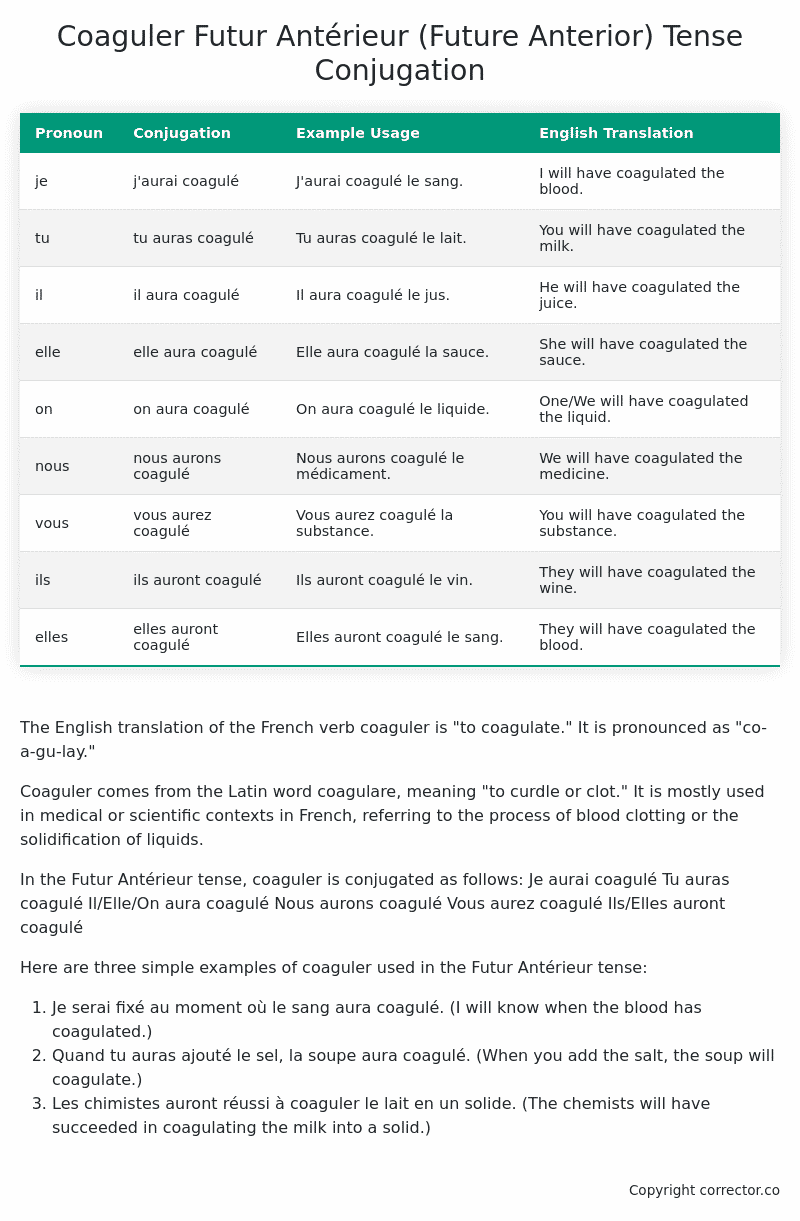Futur Antérieur (Future Anterior) Tense Conjugation of the French Verb coaguler
Introduction to the verb coaguler
The English translation of the French verb coaguler is “to coagulate.” It is pronounced as “co-a-gu-lay.”
Coaguler comes from the Latin word coagulare, meaning “to curdle or clot.” It is mostly used in medical or scientific contexts in French, referring to the process of blood clotting or the solidification of liquids.
In the Futur Antérieur tense, coaguler is conjugated as follows:
Je aurai coagulé
Tu auras coagulé
Il/Elle/On aura coagulé
Nous aurons coagulé
Vous aurez coagulé
Ils/Elles auront coagulé
Here are three simple examples of coaguler used in the Futur Antérieur tense:
- Je serai fixé au moment où le sang aura coagulé. (I will know when the blood has coagulated.)
- Quand tu auras ajouté le sel, la soupe aura coagulé. (When you add the salt, the soup will coagulate.)
- Les chimistes auront réussi à coaguler le lait en un solide. (The chemists will have succeeded in coagulating the milk into a solid.)
Table of the Futur Antérieur (Future Anterior) Tense Conjugation of coaguler
| Pronoun | Conjugation | Example Usage | English Translation |
|---|---|---|---|
| je | j’aurai coagulé | J’aurai coagulé le sang. | I will have coagulated the blood. |
| tu | tu auras coagulé | Tu auras coagulé le lait. | You will have coagulated the milk. |
| il | il aura coagulé | Il aura coagulé le jus. | He will have coagulated the juice. |
| elle | elle aura coagulé | Elle aura coagulé la sauce. | She will have coagulated the sauce. |
| on | on aura coagulé | On aura coagulé le liquide. | One/We will have coagulated the liquid. |
| nous | nous aurons coagulé | Nous aurons coagulé le médicament. | We will have coagulated the medicine. |
| vous | vous aurez coagulé | Vous aurez coagulé la substance. | You will have coagulated the substance. |
| ils | ils auront coagulé | Ils auront coagulé le vin. | They will have coagulated the wine. |
| elles | elles auront coagulé | Elles auront coagulé le sang. | They will have coagulated the blood. |
Other Conjugations for Coaguler.
Le Present (Present Tense) Conjugation of the French Verb coaguler
Imparfait (Imperfect) Tense Conjugation of the French Verb coaguler
Passé Simple (Simple Past) Tense Conjugation of the French Verb coaguler
Passé Composé (Present Perfect) Tense Conjugation of the French Verb coaguler
Futur Simple (Simple Future) Tense Conjugation of the French Verb coaguler
Futur Proche (Near Future) Tense Conjugation of the French Verb coaguler
Plus-que-parfait (Pluperfect) Tense Conjugation of the French Verb coaguler
Passé Antérieur (Past Anterior) Tense Conjugation of the French Verb coaguler
Futur Antérieur (Future Anterior) Tense Conjugation of the French Verb coaguler (this article)
Subjonctif Présent (Subjunctive Present) Tense Conjugation of the French Verb coaguler
Subjonctif Passé (Subjunctive Past) Tense Conjugation of the French Verb coaguler
Subjonctif Imparfait (Subjunctive Imperfect) Tense Conjugation of the French Verb coaguler
Subjonctif Plus-que-parfait (Subjunctive Pluperfect) Tense Conjugation of the French Verb coaguler
Conditionnel Présent (Conditional Present) Tense Conjugation of the French Verb coaguler
Conditionnel Passé (Conditional Past) Tense Conjugation of the French Verb coaguler
L’impératif Présent (Imperative Present) Tense Conjugation of the French Verb coaguler
L’infinitif Présent (Infinitive Present) Tense Conjugation of the French Verb coaguler
Struggling with French verbs or the language in general? Why not use our free French Grammar Checker – no registration required!
Get a FREE Download Study Sheet of this Conjugation 🔥
Simply right click the image below, click “save image” and get your free reference for the coaguler Futur Antérieur tense conjugation!

Coaguler – About the French Futur Antérieur (Future Anterior) Tense
Construction
Common Everyday Usage Patterns
Interactions with Other Tenses
For example
Summary
I hope you enjoyed this article on the verb coaguler. Still in a learning mood? Check out another TOTALLY random French verb conjugation!


